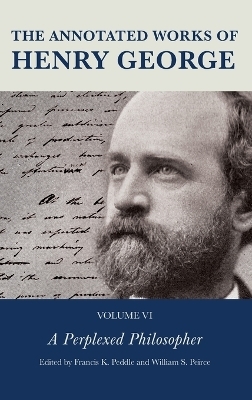
The Annotated Works of Henry George
Fairleigh Dickinson University Press (Verlag)
978-1-68393-375-5 (ISBN)
Henry George (1839-1897) rose to fame as a social reformer and economist amid the industrial and intellectual turbulence of the late nineteenth century. His best-selling Progress and Poverty (1879) captures the ravages of privileged monopolies and the woes of industrialization in a language of eloquent indignation. His reform agenda resonates as powerfully today as it did in the Gilded Age, and his impassioned prose and compelling thought inspired such diverse figures as Leo Tolstoy, John Dewey, Sun Yat-Sen, Winston Churchill, and Albert Einstein. This six-volume edition of The Annotated Works of Henry George assembles all his major works for the first time with new introductions, critical annotations, extensive bibliographical material, and comprehensive indexing to provide a wealth of resources for scholars and reformers.
Volume VI of this series presents A Perplexed Philosopher (1892), Henry George’s devastating critique of Herbert Spencer’s changing views on the land question after he achieved fame as the author of the “Synthetic Philosophy.” Social Statics (1850), Spencer’s first major work, affirms an equal right of all to the use of the earth. By the early 1890s, Spencer had recanted this view in such works as Justice (1891) and an abridged version of Social Statics (1892). This betrayal of principle by Spencer provoked George to write A Perplexed Philosopher. In this volume George’s original text is supplemented by critical annotations and an extensive topical bibliography. A comprehensive index covers all six volumes in the series.
The introductory essay by Dr. Joseph Milne, “Social Evolution and Moral Sophistry,” provides the cultural and philosophical context for George’s critical analysis of Spencer’s tortuous abandonment of the principle of equal freedom with respect to its application to the use of nature and the furtherance of equal opportunity for all. In A Perplexed Philosopher, George employs his considerable logical acumen to reveal Spencer’s multiple inconsistencies and confusions when it comes to the land question. Spencer did not respond in a systematic fashion to George’s critique. The few comments that he did make show that his understanding of the movement which George inspired was quite limited.
Henry George wrote A Perplexed Philosopher in order to correct the many confusions about the land question by a major nineteenth century philosopher. In doing so he made a significant contribution to such topics as the issue of compensation, when a wrongful entitlement is taken away from a privilege-holder, and tendency of towards materialistic positivism. A Perplexed Philosopher reveals some fundamental differences between George’s philosophical outlook and other prevailing views in the nineteenth century. A Perplexed Philosopher is not only a major contribution to nineteenth century scholarship with regard to the relation between humanity and nature, but it also illuminates a stark contrast between George’s animating philosophy of equitable reform and Spencer’s philosophy of the status quo.
Francis K. Peddle is professor of philosophy, Dominican University College, Ottawa. William S. Peirce is professor emeritus of economics, Case Western Reserve University, Cleveland.
Preface
Francis K. Peddle
Social Evolution and Moral Sophistry
Joseph Milne
A Perplexed Philosopher: Being an Examination of Mr. Herbert Spencer’s Various Utterances on the Land Question, with some Incidental Reference to his Synthetic Philosophy
Henry George
Introduction
Part I—Declaration
Chapter I—“Social Statics”—The right to land
Chapter II—The incongruous passage
Chapter III—“Social Statics”—The right of property
Chapter IV—Mr. Spencer’s confusion as to rights
Chapter V—Mr. Spencer’s confusion as to value
Chapter VI—From “Social Statics” to “Political Institutions”
Part II—Repudiation
Chapter I—Letter to the St. James’s Gazette
Chapter II—“The Man versus The State”
Chapter III—Letter to the Times
Chapter IV—This apology examined
Chapter V—Second letter to the Times
Chapter VI—More letters
Part III—Recantation
Chapter I—The fate of “Social Statics”
Chapter II—The place of “Justice” in the synthetic philosophy
Chapter III—The synthetic philosophy
Chapter IV—The idea of “Justice” in the synthetic philosophy
Chapter V—Mr. Spencer’s task
Chapter VI— “The rights to the uses of natural media”
Chapter VII—“Justice” on the right to light and air
Chapter VIII—“Justice” on the right to land
Chapter IX—“Justice”—The right of property
Chapter X—The right of property and the right of taxation
Chapter XI—Compensation
Chapter XII—“Justice”—The land question
Chapter XIII—Principal Brown
Conclusion
| Erscheinungsdatum | 05.04.2023 |
|---|---|
| Reihe/Serie | The Annotated Works of Henry George |
| Co-Autor | Alexandra W. Lough |
| Verlagsort | Cranbury |
| Sprache | englisch |
| Maße | 160 x 230 mm |
| Gewicht | 667 g |
| Themenwelt | Geisteswissenschaften ► Philosophie |
| Wirtschaft ► Volkswirtschaftslehre ► Makroökonomie | |
| ISBN-10 | 1-68393-375-3 / 1683933753 |
| ISBN-13 | 978-1-68393-375-5 / 9781683933755 |
| Zustand | Neuware |
| Haben Sie eine Frage zum Produkt? |
aus dem Bereich


